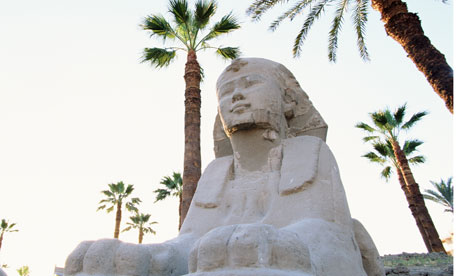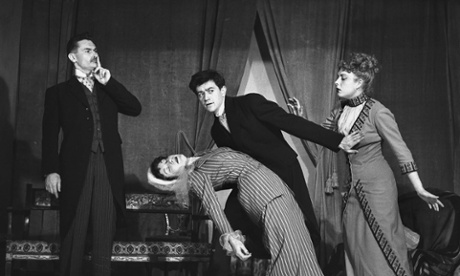The Bible Plenty of riddles here, none more famous (from Tate & Lyle's golden syrup tin) than Samson's in Judges 14: 14. "Out of the eater came forth meat and out of the strong came forth sweetness." (Answer: bees making a honeycomb in the carcass of a lion he had killed.)
Chronicles, by Apollodorus The Thebans are plagued by the monstrous Sphinx, which sits on Mount Phikion and asks them a riddle: "What has one voice, and is four-footed, two-footed and three-footed?" Oedipus turns up and provides the solution: man. The Sphinx kills herself.
The Exeter Book This anonymous collection of Anglo-Saxon riddles has inspired poets and contains its riddling self-description (in Craig Williamson's translation). "A life-thief stole my world-strength, / Ripped off flesh and left me skin, / Dipped me in water and drew me out, / The hard blade, clean steel, cut, / Scraped-fingers folded, shaped me. / Now the bird's once wind-stiff joy / Darts often to the horn's dark rim, / Sucks wood-stain, steps back again / With a quick scratch of power, tracks / Black on my body, points trails".
Piers Plowman, by William Langland One of Langland's puzzles still perplexes academics. After dinner in the house of Conscience, Patience explains what love has taught him in the form of a riddle. "The myddel of the moone is the might of bothe. / And herwith am I welcome ther I have it with me." These are the more intelligible lines: the answer is apparently charity.
The Merchant of Venice, by William Shakespeare Portia's father sets her suitors to choose from three caskets, guided only by their riddling labels. "Who chooseth me shall gain what many men desire," declares the gold one. "Who chooseth me shall get as much as he deserves," declares silver. "This third, dull lead, with warning all as blunt, / 'Who chooseth me must give and hazard all he hath'." Guess which gets the girl?
Emma, by Jane Austen Oleaginous vicar Mr Elton gives his own rhyming riddle to Emma and her dim-witted young companion, Harriet. Correctly decoded it translates as "courtship" – the girls think that this declares his romantic interest in Harriet, but no . . .
Alice in Wonderland, by Lewis Carroll "The Hatter opened his eyes very wide on hearing this; but all he said was, 'Why is a raven like a writing-desk?'" Alice is delighted. "I'm glad they've begun asking riddles – I believe I can guess that."
Ulysses, by James Joyce Stephen Dedalus ends his history lesson with a riddle. "The cock crew, / The sky was blue: / The bells in heaven / Were striking eleven. / 'Tis time for this poor soul / To go to heaven." None of the pupils can get it. "What is it, sir? We give it up. Stephen, his throat itching, answered: – The fox burying his grandmother under a hollybush."
The Hobbit, by JRR Tolkien Bilbo has to defeat Gollum in a riddle competition if he is to escape from the tunnel under the Misty Mountains. Here is his first one. "Thirty white horses on a red hill, / First they champ, / Then they stamp, / Then they stand still." Answer: teeth. Gollum's reply? "Voiceless it cries, / Wingless flutters, / Toothless bites, / Mouthless mutters." Easy.
The Da Vinci Code, by Dan Brown Professor Robert Langdon and his lovely sidekick Sophie Neveu put their brains to the unravelling of the least plausible conspiracy in the history of fiction. Of course there are riddles, including one that tells them to seek an orb on the tomb of "a knight a pope interred". They infer that this refers to the tomb of Sir Isaac Newton in Westminster Abbey (because Alexander Pope wrote verses about him). The orb is the apple that fell on his head. JM





